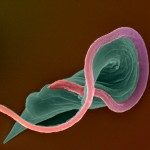Lien vers Pubmed [PMID] – 23555264
PLoS Pathog. 2013 Mar;9(3):e1003260
Antigenic variation in African trypanosomes requires monoallelic transcription and switching of variant surface glycoprotein (VSG) genes. The transcribed VSG, always flanked by ’70 bp’-repeats and telomeric-repeats, is either replaced through DNA double-strand break (DSB) repair or transcriptionally inactivated. However, little is known about the subtelomeric DSBs that naturally trigger antigenic variation in Trypanosoma brucei, the subsequent DNA damage responses, or how these responses determine the mechanism of VSG switching. We found that DSBs naturally accumulate close to both transcribed and non-transcribed telomeres. We then induced high-efficiency meganuclease-mediated DSBs and monitored DSB-responses and DSB-survivors. By inducing breaks at distinct sites within both transcribed and silent VSG transcription units and assessing local DNA resection, histone modification, G2/M-checkpoint activation, and both RAD51-dependent and independent repair, we reveal how breaks at different sites trigger distinct responses and, in ‘active-site’ survivors, different switching mechanisms. At the active site, we find that promoter-adjacent breaks typically failed to trigger switching, 70 bp-repeat-adjacent breaks almost always triggered switching through 70 bp-repeat recombination (∼60% RAD51-dependent), and telomere-repeat-adjacent breaks triggered switching through loss of the VSG expression site (25% of survivors). Expression site loss was associated with G2/M-checkpoint bypass, while 70 bp-repeat-recombination was associated with DNA-resection, γH2A-focus assembly and a G2/M-checkpoint. Thus, the probability and mechanism of antigenic switching are highly dependent upon the location of the break. We conclude that 70 bp-repeat-adjacent and telomere-repeat-adjacent breaks trigger distinct checkpoint responses and VSG switching pathways. Our results show how subtelomere fragility can generate the triggers for the major antigenic variation mechanisms in the African trypanosome.

